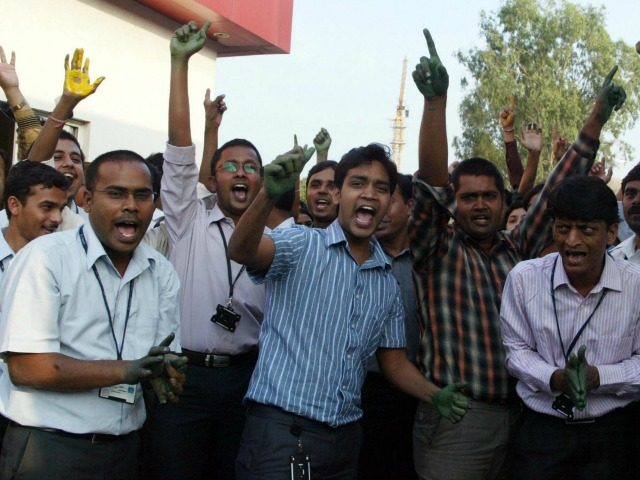Judges should ban the president’s immigration reform to ensure that high-tech companies can continue hiring foreign workers instead of American professionals, says a new courtroom brief submitted by almost 100 technology companies.
The White House’s Jan. 27 immigration reform “threatens companies’ ability to attract talent, business, and investment to the United States,” says the legal brief by the companies, who include many Silicon Valley firms. The signers include Google, Facebook, Microsoft, Twitter, Reddit, Paypal, Netflix, Lyft, and TaskRabbit, which helps wealthier people hire other people to do household chores.
The 53-page, green-eyeshade demand for economic benefits was submitted Feb. 5 to the Ninth Circuit Court of Appeals, as part of the legal battle to block the popular reform.
The new reform follows the president’s campaign promises by curbing the annual inflow of taxpayer-supported refugees, and setting rules to exclude migrants with “hostile attitudes,” such as an ideological willingness to use violence.
The companies’ legal brief is focused on their claim that they will lose their ability to hire foreign workers for some of white-collar jobs sought by American graduates.
Each year, roughly 800,000 young Americans graduate from college with skilled degrees in business, science, medicine and technology. But many of the graduates are not working in jobs that match their technical skills. For example, from 2009 to 2013, “about one-fifth of underemployed recent college graduates—roughly 9 percent of all recent graduates—did work in a low-skilled service job,” says a 2016 report by two federal economic researchers.
The federal government annually imports 1 million legal immigrants, and allows companies to hire roughly 1 million foreign contract-workers. The inflow of white-collar contract workers is so large that roughly 1 million are now legally employed in white-collar jobs in the United States, including 100,000 H-1B contract-workers holding prestigious jobs at universities.
Many companies want to preserve the inflow of cheaper white-collar workers. For example, executives at Comcast organized a demonstration against the immigration and refugee reform.
According to the courtroom brief by the technology companies:
The [reform] effects a sudden shift in the rules governing entry into the United States, and is inflicting substantial harm on U.S. companies. It hinders the ability of American companies to attract great talent; increases costs imposed on business; makes it more difficult for American firms to compete in the international marketplace; and gives global enterprises a new, significant incentive to build operations—and hire new employees—outside the United States…
This instability and uncertainty will make it far more difficult and expensive for U.S. companies to hire some of the world’s best talent—and impede them from competing in the global marketplace. Businesses and employees have little incentive to go through the laborious process of sponsoring or obtaining a visa, and relocating to the United States, if an employee may be unexpectedly halted at the border.
Skilled individuals will not wish to immigrate to the country if they may be cut off without warning from their spouses, grandparents, relatives, and friends—they will not pull up roots, incur significant economic risk, and subject their family to considerable uncertainty to immigrate to the United States in the face of this instability.
The companies’ legal brief largely ignores the effort by Americans to win higher salaries, more secure employment and it also ignores the gains to civic cohesion from reduced social confusion and uncertainty. Instead, the brief claims there is “bedrock guarantee” of benefits for immigrants and employers:
Immigrants, family members, and businesses deserve much better—and Congress and the Constitution entitle them to an immigration system that is administered reasonably, non-arbitrarily, and in accord with statutory requirements. The Order contravenes that bedrock guarantee.
Roughly 86 percent of people living in the United States are native-born Americans. But the legal brief also excluded ordinary Americans from their own nation, saying that the country is a nation of “immigrants,” not of native-born Americans.
America proudly describes itself as “a nation of immigrants” … We are: in 1910, 14.7% of the population was foreign born; in 2010, 12.9%.2 A quarter of us have at least one parent who was born outside the country. Close to half of us have a grandparent born somewhere else. Nearly all of us trace our lineage to another country.
Each year, 4 million American youths enter the workforce to seek jobs that pay enough to afford a house and a family.
The federal government’s policy of importing a huge number of legal immigrants and contract workers lowers Americans’ salaries by roughly $500 billion a year, according to a Harvard professor, Nearly all of $500 billion is scooped up in greater profits for companies and investors. If the worker inflow is reduced, Americans’ wages will rise and investors’ stock prices will temporarily fall, according to a June 2016 report by a stock-market firm.
ManyAmericans are unemployed or have given up looking for work. Roughly 10 percent of American “prime age” men, or 7 million men aged 25 to 54, have dropped out of the nation’s workforce, at enormous cost to themselves, their communities and to the nation’s economic health. Many other Americans are stuck in low-wage work in the heartland of the nation, while investors create jobs for immigrants along the two coasts.
Read the legal brief here.

COMMENTS
Please let us know if you're having issues with commenting.